
Casio Sessions 2024 winners: Crispin Burton and Dilettante. Crispin: “I have always found my best songs are the ones I am fully emotionally involved with.”
The victorious songwriters tell us about the creation of their winning entries, relationship with the piano, and plans for 2025
In September, we had the privilege of attending the live final of the 2024 Casio Sessions competition at Ninety One Living Room on London’s vibrant Brick Lane. Fifteen finalists took to the stage, performing original piano-led compositions that captivated both the judges and the audience. The standard of talent was impressive, and the competition was fiercely contested. In the end, joint winners Crispin Burton and Dilettante (Francesca Pidgeon) stood out with their pieces, If You Hear My Voice and I’m In Love With Falling In Love. Their victory earned them a Casio PX-S7000 digital piano and an exclusive studio session, where they’ll have the opportunity to press their winning song to vinyl, courtesy of Breed Media.
Having experienced their standout performances firsthand, we were keen to learn more about their journeys to the final and their ambitions for the future.
10 tips for the piano-playing songwriter
What can you tell us about your relationship with the piano?
Crispin Burton: “The piano for me is the most ‘royal’ instrument. Having come from a choral/cathedral background, the piano has been implemented daily in my life. From rehearsals to singing every day, and then starting to learn the piano at age seven, working my way up the grades. I remember the first time I learnt a piece of music that wasn’t just for grades, I Giorni by Ludovico Einaudi – I think this had a part to play in me experimenting and starting to improvise on the piano, which then obviously led me to writing music.”
Dilettante: “I’m a multi-instrumentalist but I guess in a sense, piano was the first instrument I ever played. I had a tiny kids Casio keyboard when I was about seven and I remember ‘writing songs’ on that and showing them to my mum. Piano is a great instrument because, unlike strings or woodwind, you can get to sounding pretty good pretty fast and it’s a fairly easy one to learn yourself; I’m self-taught on all my instruments and piano definitely felt like a great way into playing and writing songs that didn’t require annoying my family too much in my angsty teenage years.”
What’s your favourite piano-led song by another musician/songwriter, and why?
CB: “What a huge question, there are so many! I think, searching through my Spotify Wrapped and playlists, the one that sticks out to me is Haunted House by Holly Humberstone. There is so much raw emotion and it’s just an incredible song, with minimal production and great writing. The other track that stands out to me is Superman (It’s Not Easy) [by Five For Fighting]. I don’t know how I came across the track, but I can vividly remember hearing it for the first time. It instantly inspired me and you can hear that pop/rock ballad in my current music and new stuff that’s on its way.”
D: “So hard to choose. Nina Simone is one of my favourite musicians and her playing on Sinnerman is just phenomenal. I also love Fiona Apple, I think her piano playing is super-unique and interesting, especially on tracks like Valentine. She’s playing it more like a lead instrument a lot of the time and incorporating acoustic sounds like the piano lid closing and the hammers on the strings.
“Harry Nillson and Andy Shauf are also big ones for me. There’s a track called He Needs Me that Nillson wrote for the movie version of Popeye – a great film, Robin Williams is a spectacular leading man. The version on the film is an orchestral arrangement but there’s a certain kind of song that comes out when you’re writing at the piano and I think even when you play it on another instrument you can still hear it’s a piano tune, and that’s how I feel about that one. Shelley Duvall sings it as well and it’s just so special.
“Also, I tour in a more successful band called BC Camplight, and Brian [Christinzio] has this one tune he breaks out at solo sets called Atom Bomb that absolutely kills me. It’s very very beautiful. Genuinely one of my favourite ever songs, which feels sort of weird to say about someone you know so well.”

Casio Sessions 2024 took place at Ninety One Living Room in London. Dilettante: “Everyone’s really shit when they start and it’s just getting past that.”
How did you choose the song you wanted to enter into the competition?
CB: “For me, If You Hear My Voice was the only option. I’ve always played it live and the feedback I get from it is always that it is incredibly touching. I realised that I needed to choose a song that I connected with and that the audience could connect with as well. That being said, I also had a great video of it that was shot beautifully, so that definitely helped the decision.”
D: “A lot of my music is written with loop pedal in mind for arrangement, but on pretty much every record that comes out I have one tune that I wrote on keys which is usually a bit more confessional and chord-y, and on my next record that’s the tune that I entered for the competition. Bit of a no-brainer really, and was definitely nice to really learn a piano arrangement for something.
“My live shows are usually pretty complicated in terms of technology so it was really nice to just show up, sit down at a piano, and play something vulnerable and honest and maybe not the coolest of tunes. It was written to sound almost like it could be a jazz standard or like it came from a musical; I listened almost exclusively to music from the 1930s-50s – until I got into grunge at about 15 years old – and I think this song is coming squarely from there.”
We’d love to know more about each of them were written.
CB: “I wrote it at a time in my life when I really felt like I needed someone to talk to and felt like I didn’t have anyone listening or talking back to me. It’s all about that cry for help in a period of your life when you need it the most. I have always found my best songs are the ones I am fully emotionally involved with. Not every song is written this way, but as much as possible I want the song to be a musical take on my emotional state.
“If You Hear My Voice is the true definition of that. It wasn’t until a couple of weeks later that I realised I wasn’t just writing words and putting them to a melody, I needed to talk to someone and so I decided to reach out… I think the reason I’m quite bubbly and happy in general is because I get to feed my emotions into the music.”
D: “I wrote it after a breakup. It’s very much a self-flagellating song about not being able to stick things out past the initial exciting period into the part where things get hard. It’s about relationships but it’s also about my general problem with managing to do that. There are a lot of songs on the record I’m about to put out that are ones I felt like I’ve been trying to articulate for a long time but had never managed to do before now, and this is one of them.”
What was the Casio Sessions night like for you?
CB: “The Casio Sessions night was a fantastic experience, I met so many amazing singers and songwriters. Since then I’ve had a couple of writing sessions with the other artists and organised many others. Having such a captivated audience was nerve-wracking but also such a dream. In this early stage of being an artist, there are times when audiences don’t want to sit through depressing songs they’ve never heard, so it really was a great night that was made even better when they called my name!”
D: “Me and a few of the other acts were describing it as the highest quality open mic ever – definitely stressful because the crowd were so attentive which is always intimidating and then with it just being one tune extra stressful. But really nice to get to play with everyone else there and it felt good to just really focus on playing this one tune as well as possible.”

The Casio Sessions 2024 finalists. Crispin: “Most of the time, that first little melody or lyrical idea is what I will end up using or trying to recreate.”
And what was the first song you played when you got your new PX-S7000?
CB: “I didn’t really play a specific song, I just started writing a lot of new material. I always find new equipment, and especially something as sexy as the PX-S7000, inspires me on a completely new wave. I can certainly say I’ve written some incredible songs using the piano and I’m looking forward to writing many more.”
D: “I learnt all the different opening themes for the 90s sitcom Frasier, followed swiftly by I’m Not In Love by 10CC, because there’s a great readymade patch for that on the keyboard already. Then I think I learnt The Carpenters I’ll Never Fall In Love Again and I couldn’t really stop playing it, to be honest. I had to leave right after the keyboard got delivered and it was like leaving a newborn. It really is a lovely piano to play, it’s the kind of instrument that really invites improvement because it feels so effortless.”
Do you have a tip for people who’d like to write their first song using a piano?
CB: “In my opinion, emotion is key, I’ve written my best stuff when I’m genuinely in the song and it’s simply an expression of how I am in that moment. As I said earlier, ‘A musical take of my emotional state.’ This doesn’t have to mean you are extremely sad and soppy, it can be extremely happy and joyous. I think you always need to trust your instinct – most of the time, that first little melody or lyrical idea is what I will end up using or trying to recreate.
“Another huge tip would be to keep your voice memo recording so you can refer back to those in-the-moment ideas. If I’m coming up with a melody or I’m jamming, I always find sounding out the syllables with a melody can help shape the lyrics.”
D: “Just do it, that’s honestly always just the advice I give myself too; the hardest part is the start. Everyone’s really shit when they start and it’s just getting past that. And songs are also usually shit at the start. It takes effort! Songwriting is a skill, the same as playing an instrument, it requires a lot of practice and failure.
“I’m also not sure that any of the successful songwriters I know initially came from any mindset other than essentially songwriting being a sort of makeshift therapy either. If you don’t have anything you desperately feel the need to express and you don’t feel like writing a song is making you feel better or more fulfilled, or helping you work through difficult stuff, that’s probably a sign that it isn’t really for you.
“Practical tips-wise, I think you just really have to follow your ears and play something that sounds good and interesting to you. Listening broadly is very important and you should always be trying to listen more to stuff that maybe initially gives you a gut reaction of, ‘What IS this??’ because that’s often the stuff I grow to love the most.”
Lastly, what do you both have planned for 2025?
CB: “I have currently been on a weird trajectory of not really knowing where I’m going and finding my sound as an artist. My main thing is finding the real Crispin. I have just quit my day job as a videographer to pursue this music thing, so this year is going to be quite a journey. I am planning on releasing my debut EP, which will land a full body of work to show the world who Crispin is and what we can expect more of in the future.”
D: “Well, I have an album called Life Of The Party coming out in January with EMI North and a full band headline tour planned in March, including some international stuff in the US. Other than that, I’m just trying to keep working hard and attempting to produce good and interesting work and I’ll probably start writing on my next record around spring. There may be a lot more piano songs on the next record now I’ve got such a nice one to write on.”


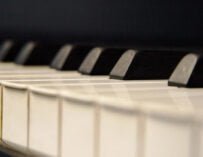
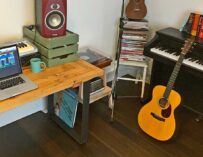



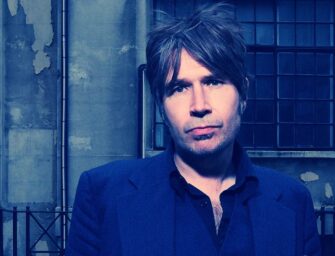

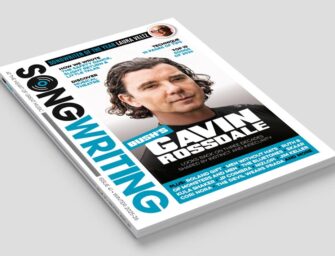
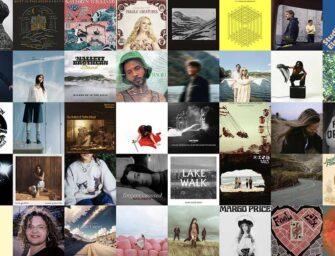
![Interview: Jessie Jo Dillon [2025]](https://www.songwritingmagazine.co.uk/wp-content/uploads/jessie-jo-dillon-2-by-libby-danforth-335x256.jpg)
























Related Articles